I’ve been playing tennis for the majority of my life at this point. But I’ve only been playing adult tournaments and leagues for 3 years now. It still amazes me, how people who have been doing this for so long, can be such bad doubles partners!
For the most part, everyone is a good partner but every 6 months or so I’ll play against a team who has me beat, only to blow it because one or both partners suck to each other :O
So this lesson, I’m going to tell you exactly how to be a good doubles partner, and get the most out of anyone you play with.
- First, I’ll show you the key components that make a good doubles partner, and exact phrases to use with your partner when they’re not playing well so you can build them back up.
- After that we’ll cover the characteristics of a bad doubles partner, and why the things they do don’t work.
- Then, we’ll conclude with some quick tips on being a good doubles partner in tennis.
What Makes a Good Doubles Partner?
There are a few characteristics that make up a good partner in tennis. You may be thinking that you’re already a good doubles partner, but keep reading to make sure you check all the boxes. You may still have room for improving your overall doubles game.
Here are a few things to focus on with your partner, especially if you’re the stronger player.
New Course!
The Mental Game Masterclass
The Mental Side of Doubles You Were Never Taught
- Perform better under pressure
- Beat more talented players
- Come out HOT early in matches
- Avoid mid-match slumps
- Become your own coach
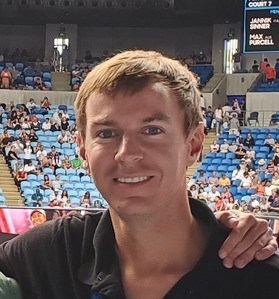
I guarantee this will transform the way you prepare for your next doubles match.
Will Boucek – ATP & WTA Doubles Strategy Analyst
1 – Know Your Partners Playing Style
Before the match, you and your partner should know each other’s strengths and preferences. Knowing this will help you create a good strategy for the match.
A few questions you might ask a new partner before the match.
- Which side do you prefer to return on? (duh)
- Do you like to play at the net more or the baseline?
- What is your favorite serve?
- Do you serve and volley?
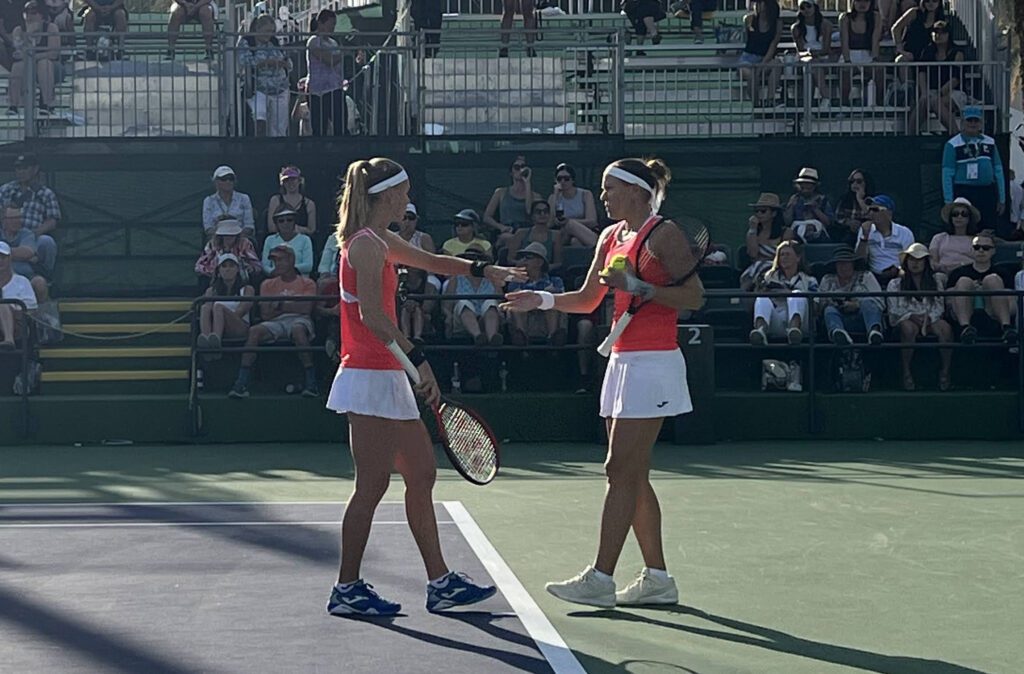
Getting to know your doubles partner with questions like these will help you both put each other in a better position and win more matches.
2 – Help Your Tennis Partner Play Their Strengths
Whether you’re the stronger player or not, you need to help your partner get in the best position for their doubles style based on their strengths as a tennis player. That might mean changing your doubles strategy.
COURSE
Net Play Strategy for Doubles
Masterclass on skills, strategy, and mindset for dominant net play in doubles!
- Over 190 minutes of Video Doubles Lessons
- 25 Whiteboard Video Lessons
- Video Analysis of over 30 ATP & WTA doubles points
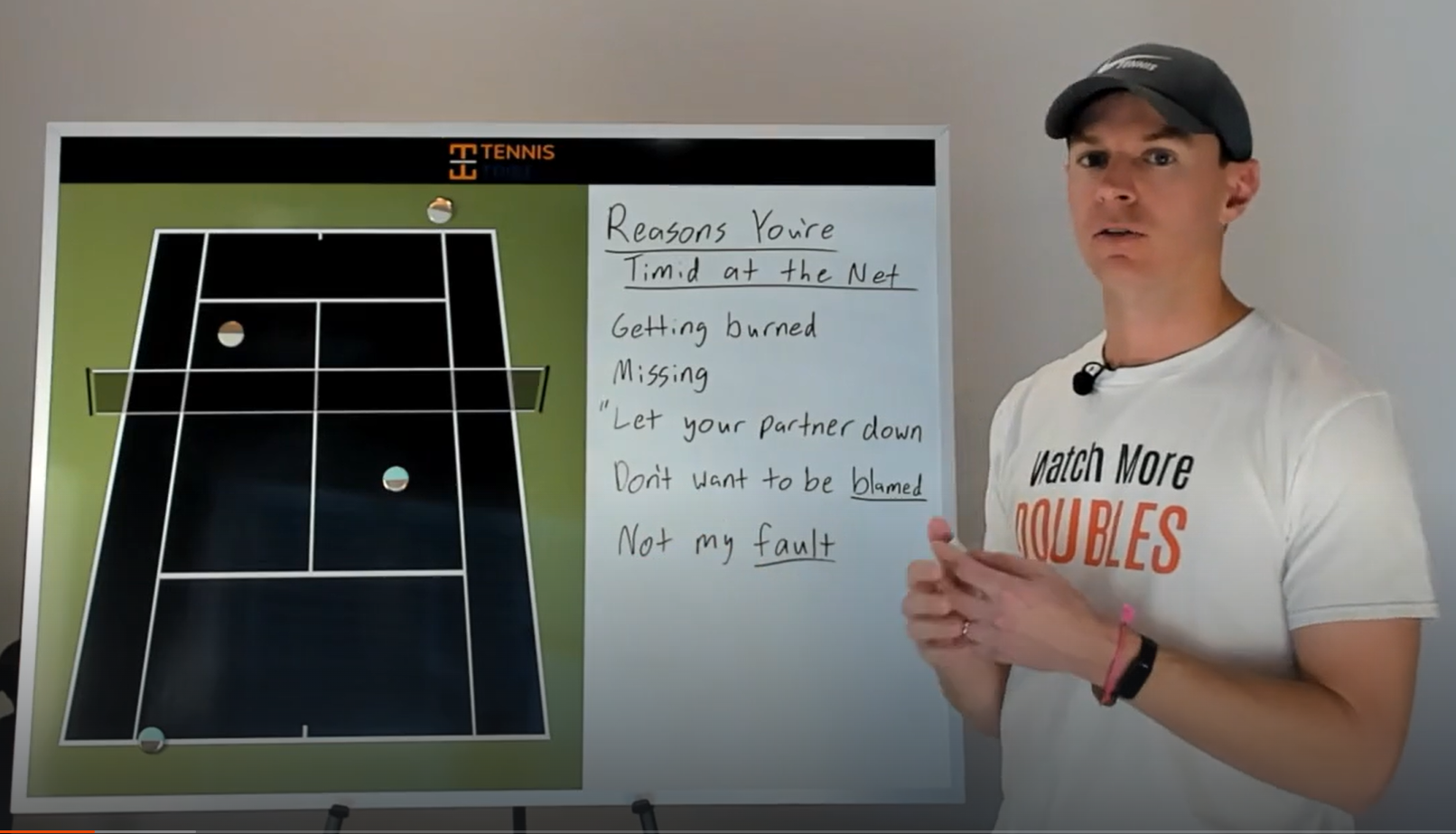
You’ll learn from Will Boucek, an ATP & WTA Doubles Strategy Analyst
Let’s say, for example, that you’re playing a team who has really good lobs. Your partner is more of a net doubles player. It’s a bad idea in this scenario, to ask your partner to stay back at the baseline. Even if they do keep getting lobbed, you need to find a way as a team, to get your partner to the net. Maybe find the weaker players backhand, which is usually the weakest lob, before having your partner charge the net.
Especially if you’re the stronger player, you need to find a way to help your partner get in positions where they are most comfortable. This will help them take advantage of their strengths and help your doubles team win.
3 – Encourage Your Partner (Especially When They Struggle)
Staying positive and being encouraging to your partner seems obvious but a lot of doubles teams don’t do this. The key is to ALWAYS be encouraging your partner.
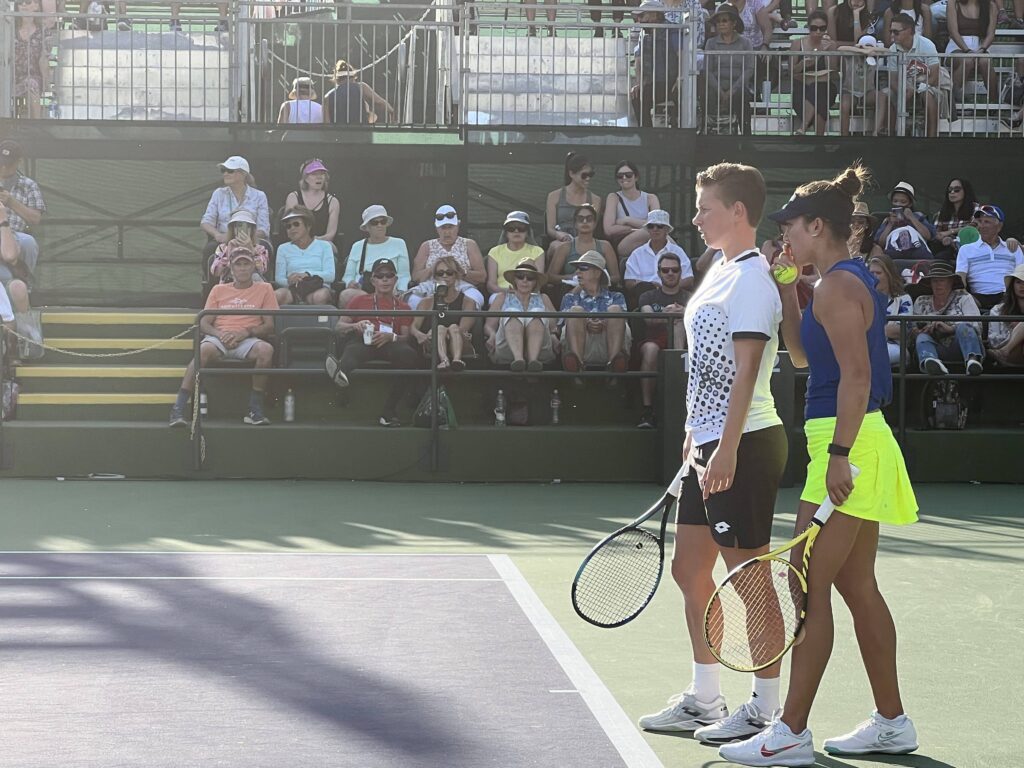
- When they’re playing well or hit a good shot. You tell them “Awesome playing!” Saying positive phrases like this will help them maintain or even raise their level further.
- When they’re in a slump, it is your job as a good doubles partner, to get them out of it. Again, stick with positive phrases like “We’re good, we got the next one.” Studies show that when things are going poorly, in sports or otherwise, shame only makes it worse.
This encouragement is crucial for a good doubles team. Most people think:
Positive Thoughts → Better Performance
This is true, so we have to think our way into playing better tennis. But this is hard. Instead, we can actually use our words and physical energy and posture to accelerate this.
MOST POPULAR COURSE!
25 Winning Doubles Tactics
Guaranteed to help you play smarter & win more matches.
- Over 50 video doubles lessons
- 60+ ATP & WTA points analyzed
- Nearly 3 hours of strategy content
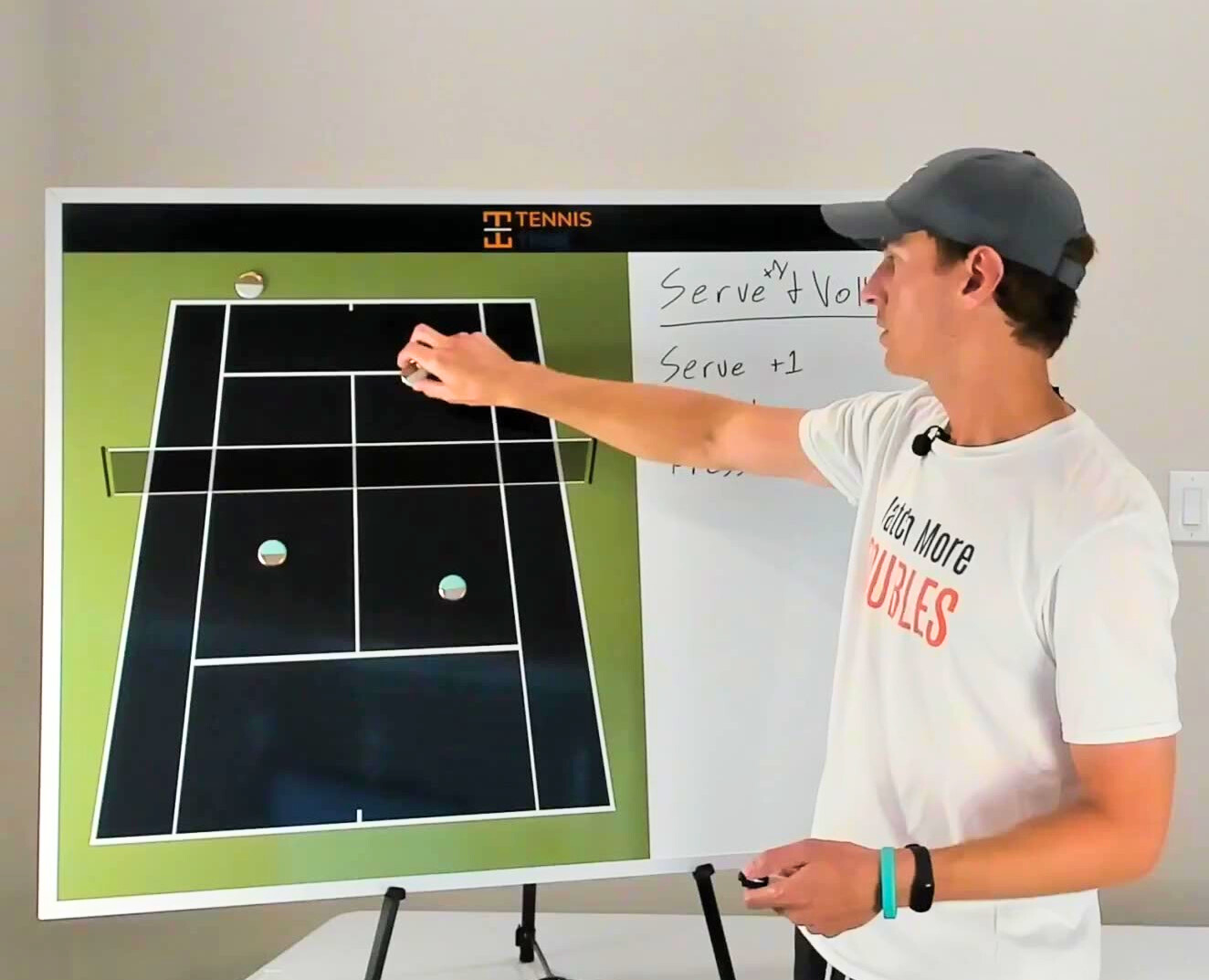
Will Boucek – ATP & WTA Doubles Strategy Analyst.
Positive Language/Energy → Positive Thoughts → Better Performance
If we can consciously force the positive phrases and energy, we can start a cycle that will lead to better performance. This is why you see people blow up on the court, they start with negative language and energy.
Side Note: If you’re interested in how this process works, check out this article on how posture affects mood by fast company. Most people think thoughts and mood affect physical energy and posture. We can actually flip this around. Simply changing your physical energy and posture will improve your mood.
The best example of staying positive in recent memory is Kevin Anderson. If you watch him between every point win or lose, he is encouraging himself. As a result, he’s had the best year of his life, making two grand slam finals.
4 – Taking Ownership (Especially If You’re The Stronger Player)
Taking ownership or blame of a lost point or game is uncommon in many doubles teams. When you’re the stronger player especially, you should be taking the pressure off your partner and letting them play their game. To do this you need to “blame” yourself or take ownership.
This is a controversial topic because people have shown that blaming yourself can negatively impact performance, so you have to be careful. Don’t be negative with yourself, but don’t let your partner do that either.
For example, if you’re partner misses an overhead, you can say something like “no problem, I should have ended the point earlier on that volley. My bad. I’ll get the next one.” Do not say things like “that’s my fault. I’m blowing it.”
COURSE
League Doubles Training Masterclass
My proven doubles formula makes winning much easier
- Game plans for every common scenario in 3.0 – 4.0 doubles
- Nearly 3 hours of video training
- 1-on-1 strategy call
Create smarter game plans that match up your strengths vs your opponents’ weaknesses.

I guarantee this will transform the way you game plan for your next league match.
Will Boucek – ATP & WTA Doubles Strategy Analyst.
Always ending language on a positive note is important.
Taking ownership on the court shows your partner a few things:
- I’ve got your back.
- We’re a team, in this together.
- It’s not your fault, I have to be better too.
This will take pressure off your doubles partner, help them feel supported, and let them play with confidence.
5 – Communication, Good Doubles Partners Say “We” & “I” Instead of “You”
Communication is obviously very important with your doubles partner. One characteristic of a good leader is that the people around them feel like a team, on the same level. This is true in doubles too.
One easy tip for becoming a better doubles partner is to avoid the word “you” in any negative context. Doubles is a team effort so it almost always should be “we.”
This mostly applies to bad situations since, as we’ll find out, bad partners are only bad when they’re losing. Here’s a table to help you understand the difference.
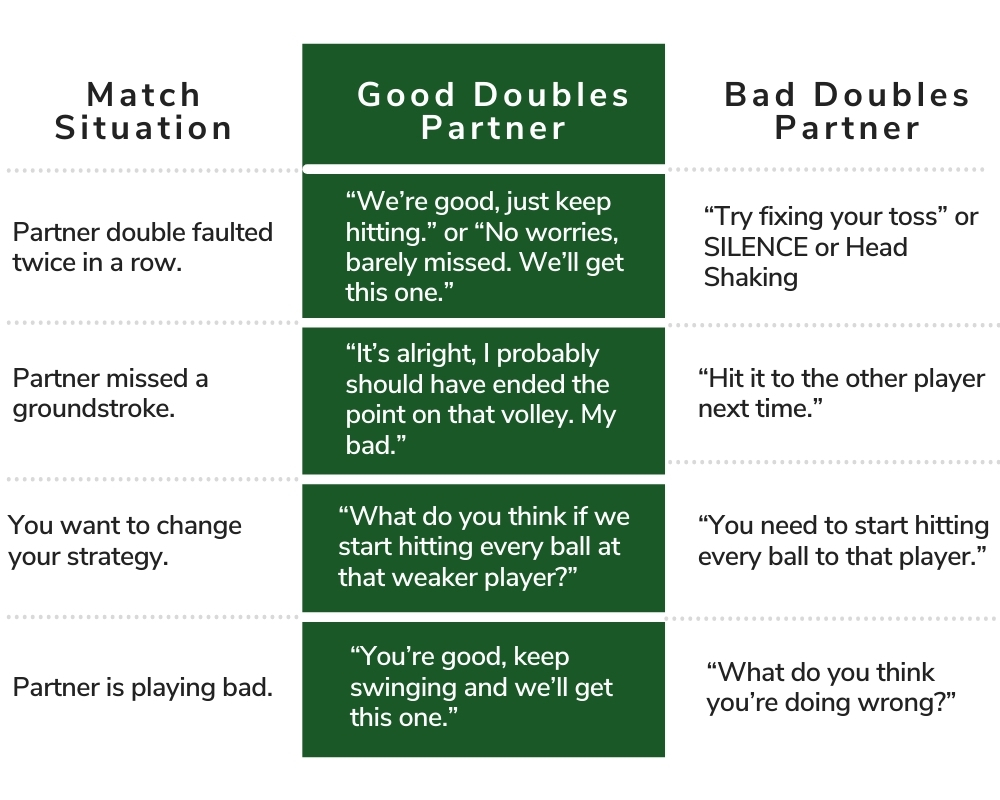
Things Good Doubles Partners DON’T Do (or how to be a bad partner)
It’s hard enough to learn how to be a good doubles partner. One way to become a better doubles partner, however, is by studying tennis players who do it wrong! Bad partners have a few things in common that you want to avoid. But how do you know if someone is being a bad partner?
What is the actual difference between a good doubles partner and a bad one?
To really find out, you have to go to the points that you lose!
Everyone is a good doubles partner when they’re winning and things are going well. It’s when a doubles match is NOT going your way that you can separate the good from the bad partners.
So what do bad doubles partners do when they start losing? A few things.
Ask Too Much From Your Doubles Partner
If you’re the stronger player especially, never ask your partner to do more than what they’re comfortable with. One of the fastest ways to lose is by trying to hit bigger serves and harder forehands than what you’re used to.
Let’s say your opponent has a weak backhand return, but your partner doesn’t have a great kick serve and struggles to serve it to the backhand. A bad partner might ask them to serve it to the opponent’s backhand anyways. This is a bad idea. Instead, you should tell them to hit their stronger serve and try to get the next shot to their backhand.
You should never ask your partner to start hitting shots that are weaknesses for them. Instead, play your game and use strategy to find ways beat the other team.
Blame Your Doubles Partner
This isn’t always done directly, it’s more of a backhanded push with a less than pleasant tone to play differently than you’re playing now.
Common phrases I hear from bad partners:
- After double faults – “Just get this one in. We need this game.”
- After a missed groundstroke – shrug and “What are you doing wrong?”
- Missed an easy volley – SILENCE! Or shaking your head
In all of these, there is no positivity. It’s all putting pressure on the partner through blame or disappointment. No one performs better when they feel like they’re being blamed for something.
Coaching Your Partner Mid-Match
This one is a little trickier. I’m not saying you shouldn’t try new strategies. But you have to be careful about what you’re demanding from your partner during a match.
The middle of a match is a bad time to change their forehand or serve technique!
I’ve played doubles matches where my doubles opponent, especially the stronger player, helped me win by overteaching their weaker partner. This can confuse your partner, make them feel blamed, and play much worse.
Here are a few situations to avoid.
- Telling your partner what to do, especially if it’s not their strengths
- Saying things like “don’t do that” or even “do this next time”
- Shaking your head when they double fault, or even being silent
In summary don’t be any of these guys…
Conclusion: How To Be The Perfect Tennis Partner
Doubles is a team effort, and unless you support your partner, you could be in for a frustrating match. To recap, follow these tips to be a good doubles partner.
- Know your partner’s doubles style, strengths, and weaknesses.
- Use doubles strategy to take advantage of each other’s strengths.
- Encourage your partner with words like “I” & “we”, and have positive energy.
- Take ownership of each point, game, and set.
Following these guidelines on how to be a good doubles partner, combined with developing a good strategy, will help your doubles team win more tennis matches, and beat teams that are even more talented than you.
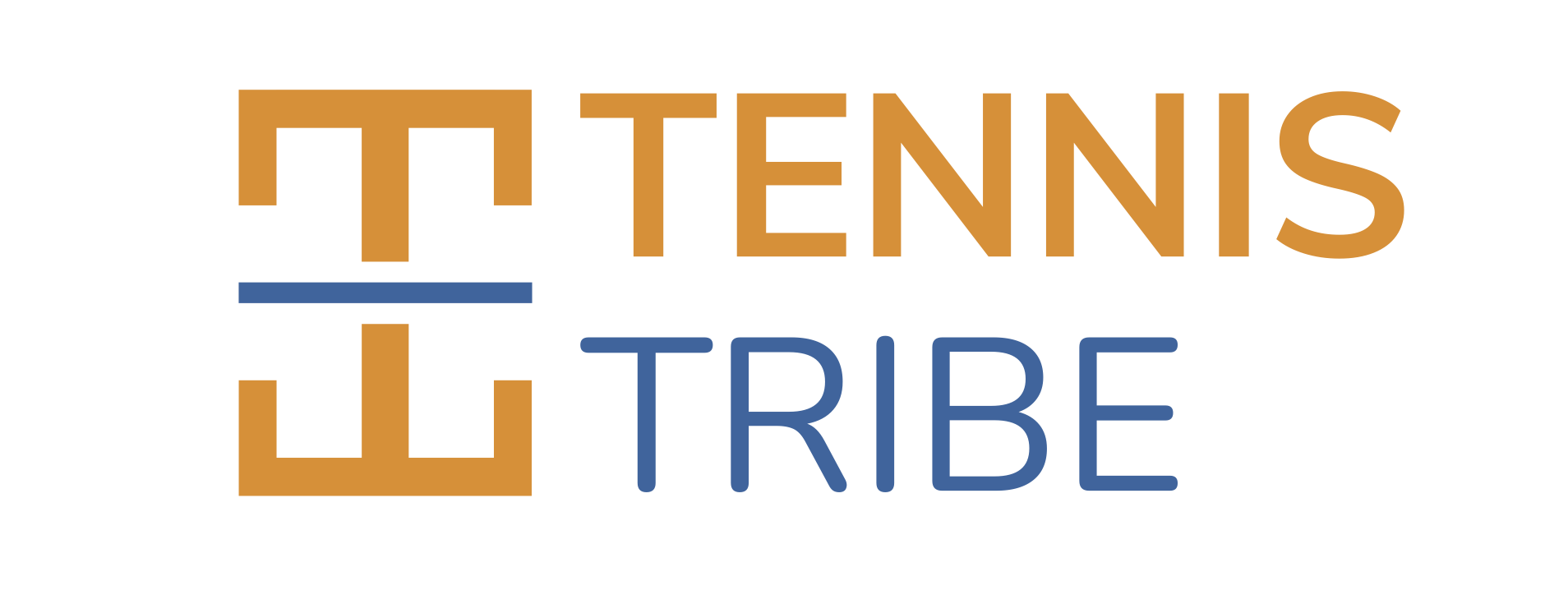
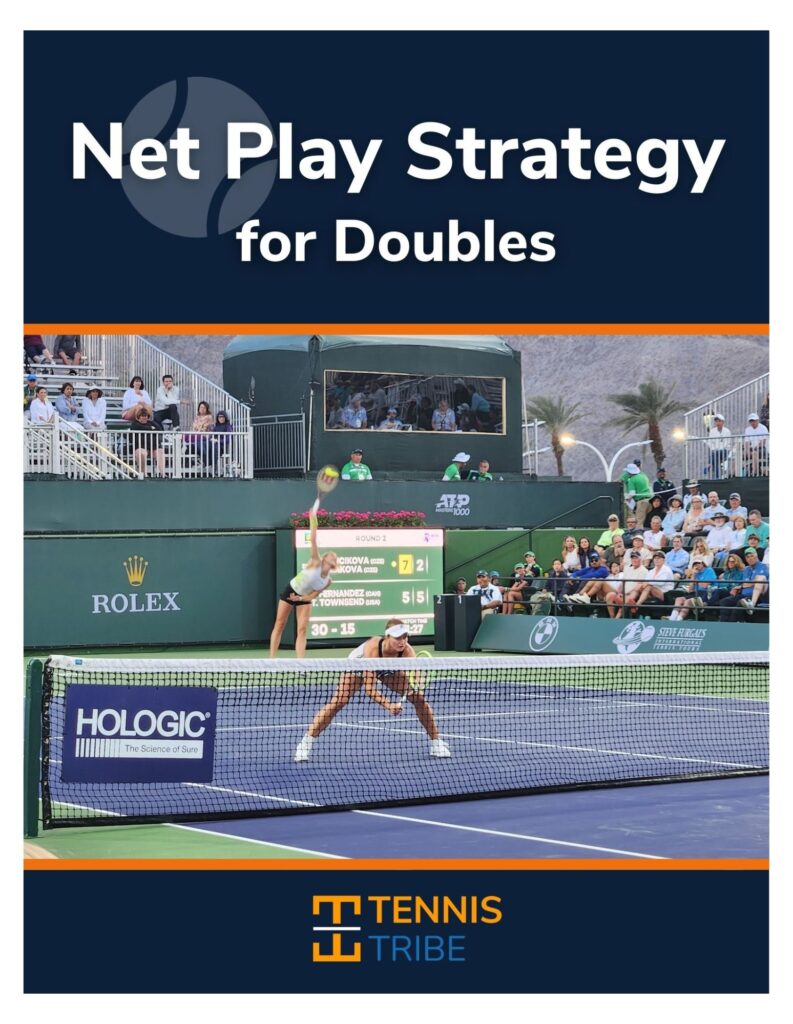
You write insightful and educational articles. Keep them coming! I would like to edit your articles for ‘your’ and ‘you’re’ context. Sometimes it is used correctly and sometimes it is mixed up. It is commonly confused. I would be happy to proof read for you. 🙂
Sandra
Thanks Sandra!
If you see any errors, feel free to email them to me. I do my best but I know I don’t see everything.
As Bjorn said to John MacEnroe…c’mon relax..be nice!
Consequently John was arguably the best doubles player ever so he likely was a very good supportive partner. You can see this on display as he is a good coach in the Laver Cup, never down on players only positive.
Great points! He did get down/mad in singles, but you can’t do that to a doubles partner 😉
Can your partner in doubles call a shot out verbally as he can see a shot going out on his partners side of the court to prevent his partner from going for that ball?
Hi Merv, yes… that’s often a good idea because the other player has a better angle to see if the ball will go out.
You are not allowed to yell when the ball is traveling toward the opponent, however.
Some good tips here. Like using “we” and taking ownership rather than blaming. Never coaching.
Also we improved our performance by avoiding displays of negativity: either to opponents or even to each other.
We see the team as more important than its players. When a player succumbs to anger and negativity and moping they are being about themselves not about the team. We apply the same rules to a team of 2 as we would to a team of 5 or a team of 11.
Great way to look at it. Team first, me second 🙂
I try to remember that many times I have set my tennis partner up in a bad way. I sent over to easy of a short, the other team puts the ball away by hitting to my teammate. Looks at first that my teammate lost our side the point, in reality it was my shot that caused the other team to hit a great shot at my teammate.. Own it..
Absolutely Kevin! Doubles is a team effort. Never blame your partner 🙂
This article is amazing! I really like the positives but the negatives NEVER work.
Thanks! Yep, reframing your communication in a positive way with your doubles partner is always best 🙂
Hi, in doubles communications, is it that always the person who intends to take the ball is allowed to say “mine” ? Meaning the net person seeing himself not capable of taking the ball (say ball higher than he expected) should NOT say “yours” to tip his partner in the baseline to take it?
Hi Mary, it is good to say “mine” or “yours” depending on the situation. More communication is better. The net player should definitely say “yours” if they cannot reach the ball in that case.